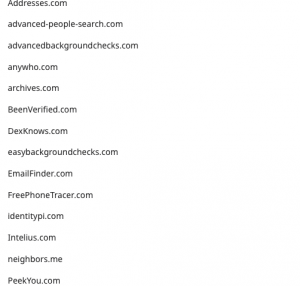Kierra Davis
Introduction
I don’t really use social media. If you search my name, you won’t find any profiles belonging to me on Instagram, LinkedIn, TikTok, Facebook, Twitter - nothing. The only social media I have is Snapchat, and that’s pretty small and managed – I only add my friends (and a select few family members).
My initial reasons for never really becoming involved with social media weren’t particularly rooted in privacy concerns. I just didn’t want the hassle of trying to maintain an online social persona and curated image of myself. But after hearing about the privacy complaints directed at social media platforms in recent years, it felt like it was for the best that I don’t really use any of it. And I liked that people couldn’t really find out much about my personal life.
But what I discovered from this assignment is that social media platforms are not the only ones deserving of privacy-violation accusations. I didn’t expect to see many search results related to me since I haven’t really built an online presence, but instead what I found was more personal than anything I would have been comfortable with if I did use social media. I realized that despite how much I try to manage what others know about me, there still exists a lot of information that I don’t have any control over.
On The Surface...
I did a few different searches using my name and adding on the name of my hometown, as well as “University of Michigan”. Googling just my name returned a lot of results that weren’t related to me. While there were rarely people in my school growing up who shared the same name as me, Kierra Davis is actually a really common name and it was initially a little difficult to find information about me. The searches including my hometown and school were the ones that started returning some accurate results.
Majority of the information on Google connected to me centered around my academics and academic activities. There were articles written by others about my high school, community college, or university, such as one post highlighting an event from the honor society I was a member of at my community college. My name also came up on the website of a research lab I worked at in 2019. In addition, there were some blog posts I had to write when I was in a summer research program, so those managed to make their way into the search results too and are forever memorialized on the internet.
...And Underneath
When I looked a little further down the search results, I found the websites showing addresses - there were a few of those, such as the Michigan Database website. The address I used to live at in my hometown was there alongside my name and age. My mother’s and brother’s information also came up as they still live at that address now, complete with their ages and phone numbers, and the same appeared for other relatives the sites connected to me. Some things were inaccurate, but majority was correct. One of my addresses in Ann Arbor also had found its way onto Google, and I’ve only had 2 total addresses in Ann Arbor; I couldn’t find my current apartment listed anywhere, but it’s probably only a matter of time before that’s searchable too.
Reflections and Concerns
Reviewing everything I found connected to me, overall it paints an accurate picture; if someone searches for me, they will probably think I’m a person that cares about academics through the articles written about my school life, and they’d see some of the research and programs I’ve participated in and know somewhat about the things I’ve been doing in recent years. I’ve tried to control what I put out on the internet, yet these articles I found were not written by me and I can’t modify the blog and research websites to remove my information; there are still things concerning me that I have no say in. But I’m not really bothered by this; while I was initially surprised to see any information related to me at all online, this still isn’t much of a look into my personal life, as compared to the possibilities of what might have been discovered if I had a social media presence. Results related to academics could even be considered positive, because those are typically regarded highly and might benefit me if an employer or school were to see them. If this is all the insight into my life that’s available online, I’ll take it. It seems like it’ll do more help than harm.
But I don’t share the same attitude for the results regarding my addresses and other details. I was surprised to find that information staring me in the face; I knew it existed, but I thought much of this information would be behind a paywall and not easily accessible. It’s disconcerting because it isn’t hard to imagine the ways in which this information could be abused. Having these sort of personal details online could lead to getting spam mail or scam phone calls, or someone easily stalking or threatening you. The addresses also allow for someone to make a few more clicks looking up information on your city, and finding results guessing your income level and the type of environment you grew up in. People can make generalizations about you and have biases against you with this sort of information. It was pretty uncomfortable to see this particular branch of personal information about me online that I cannot control.
What’s more surprising is the fact that it’s allowed. After doing these Google searches, I decided to look into how I could remove mine and my family’s personal details from these sites, and I read about how these sites work. This sensitive information is technically legal to be publicly available online, because much of it comes from public records. These sites then buy the records from these offices so they can earn money from things like offering background checks and selling your information too. It seems wrong that public institutions meant to serve the people are selling your data, the very same violation social media platforms are accused of. You can stay off of social media, but you can’t keep your records from public institutions because you are a member of that society and have to share that sort of information. So what can you do?
Well, it doesn’t seem like it would be easy to scrub the internet of this personal information, either. The suggestions for removing your personal information from these public sites were pretty bleak and depressing. A lot of articles written to guide the scrubbing process stated that it’s practically impossible to ever fully remove that information. I came across a post on Reddit that had an extremely long (and still growing) list of sites that store addresses and related information, which simply doesn’t seem a feasible list to sift through. The privacy statements of the websites themselves make it difficult to remove your information. One of them on cyberbackgroundchecks.com failed to even allow me to submit a request for removal. And many people said that they’ve successfully removed their information from a website, and then checked back a few weeks later to find it there again. So keeping this information off the internet appears to be virtually impossible.
So while I think I’ve done a good job of managing what I can control on the internet, it doesn’t seem to matter much when there’s plenty more I can’t do anything about.

